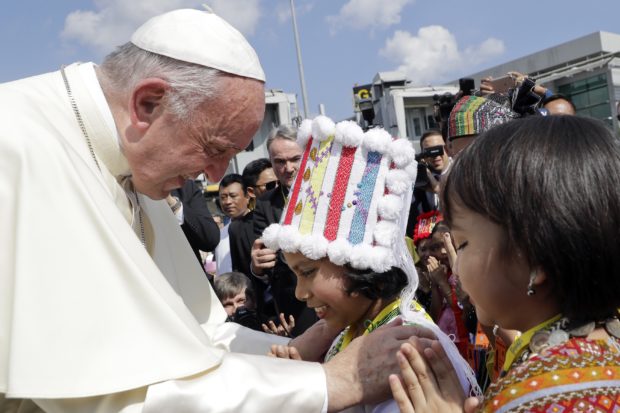Pope’s visit to Myanmar turns on 1 word: Rohingya

Pope Francis is greeted by young children in traditional clothes upon his arrival at Yangon’s airport, Myanmar, Monday, Nov. 27, 2017. The pontiff is in Myanmar for the first stage of a week-long visit that will also take him to neighboring Bangladesh. (AP Photo/Andrew Medichini)
VATICAN CITY/DHAKA—Pope Francis is visiting Myanmar and Bangladesh to encourage their tiny Catholic communities and reach out to some of Asia’s most peripheral and poor, but the big question looming is whether he’ll utter the word “Rohingya” while he’s there.
The “will he or won’t he?” issue has dominated debate before Francis’ trip, which began on Monday when his Alitalia charter flight landed in Yangon, and will end with a youth rally in Dhaka, the capital of Bangladesh, on Dec. 2.
In between, Francis will meet separately with Myanmar’s civilian leader, Aung San Suu Kyi, its powerful military chief and Buddhist monks.
He’ll greet a delegation of Rohingya Muslims and meet with Bangladesh’s political and religious leadership in Dhaka.
Masses for the Catholic faithful and meetings with the local Church hierarchy round out the itinerary in each country.
Article continues after this advertisementUnrecognized minority
Myanmar’s local Catholic Church has publicly urged Francis to avoid using the term “Rohingya,” which is shunned by many locally because the ethnic group is not a recognized minority in the country and not even identified as Rohingya.
Article continues after this advertisementThey are instead labeled “Bengalis”—shorthand for illegal immigrants from Bangladesh.
Rohingya in recent months have been subject to what the United Nations says is a campaign of “textbook ethnic cleansing” by the military in poverty-wracked Rakhine state.
Francis, though, has already prayed for “our Rohingya brothers and sisters,” and any decision to avoid the term could be viewed as a capitulation to Myanmar’s military and a stain on his legacy of standing up for the most oppressed and marginalized of society, no matter how impolitic.
“Being a religious leader—Catholic leader—means that he is well-regarded, but of course there is this worry if he says something, people might say, ‘OK, he just came to meddle,’” said Myanmar analyst Khin Zaw Win, a former political prisoner.
“So, I think a lot of diplomacy is needed, in addition to the public relations,” he added.
The trip was planned before the latest spasm of violence erupted in August, when Rohingya militants attacked security positions in Rakhine.
Mixed signals from Vatican
Myanmar security forces responded with a scorched-earth campaign that forced more than 620,000 Rohingya to flee to Bangladesh, where they are living in squalid refugee camps.
The signals from the Vatican going into the trip were mixed: The Vatican spokesperson used the term “Rohingya” in a pretrip briefing and said “it’s not a prohibited word” as far as the Vatican was concerned.
But the Holy See’s secretary of state, Cardinal Pietro Parolin, avoided the term in an interview with Vatican media on the eve of the trip.
The debate isn’t just semantic: Myanmar’s government and most of the Buddhist majority consider them Bengali migrants from Bangladesh living illegally in the country, though Rohingya have lived there for generations.
Seaman Kyaw Thu Maung said the issue was difficult because the term “Rohingya” carried so much political weight for all of Myanmar’s people.
“But my feeling is that if the Pope is going to talk about the Rakhine issue, the people aren’t going to like the Pope anymore,” he said.
While attention will focus on how Francis refers to the Rohingya crisis, his trip also holds significance for the tiny Catholic communities in Myanmar and Bangladesh.
Those Catholics face obstacles that include discrimination, an inability to land leadership roles and threats of violence.
Many Christians hope the Pope’s visit will highlight the plight of the poor and of minority religious groups, including their own.
Myanmar Catholics
There are 660,000 Catholics in Myanmar, just over 1 percent of the population of 53 million.
In total, Christians make up just over 6 percent of the population.
Catholicism was brought to the country more than 500 years ago, and for generations Catholics have played a vital role in developing far-flung rural areas that authorities have found hard to reach.
But when the socialist government took power in 1965, most Catholic-based missionary schools, boarding houses and properties were seized by the military at gunpoint.
Catholics were later able to rebuild their missions.
Battling discrimination
Myanmar Catholic leaders say that as members of one of the smallest religious groups in a country dominated by Buddhism, they face discrimination, even if it isn’t typically overt threats or torture.
“There are always challenges to stand up as Catholic and to have strong faith here,” said Rev. Mariano Soe Naing, a spokesperson for Myanmar’s bishops’ conference.
Christianity is viewed by many as a colonial belief until Myanmar’s independence in 1948. Likewise, the separation of Church and State is considered a foreign imposition.
For the past 18 years, Myanmar has been listed by the United States as a “country of particular concern” under the International Religious Freedom Act for having engaged in, or tolerated, severe violations of religious freedom.
But unlike Rohingya Muslims, Christians haven’t faced widespread violence and persecution.
Christian leaders say they’re afforded “peaceful coexistence” and an understanding the government won’t interfere.
But Catholics don’t play a broader leadership role in society.
“To be honest, if you are a Christian in this country, you will never get promoted,” Mariano said. “There are no Catholics in the government administration or in any significant leadership position.” —REPORTS FROM AP AND AFP